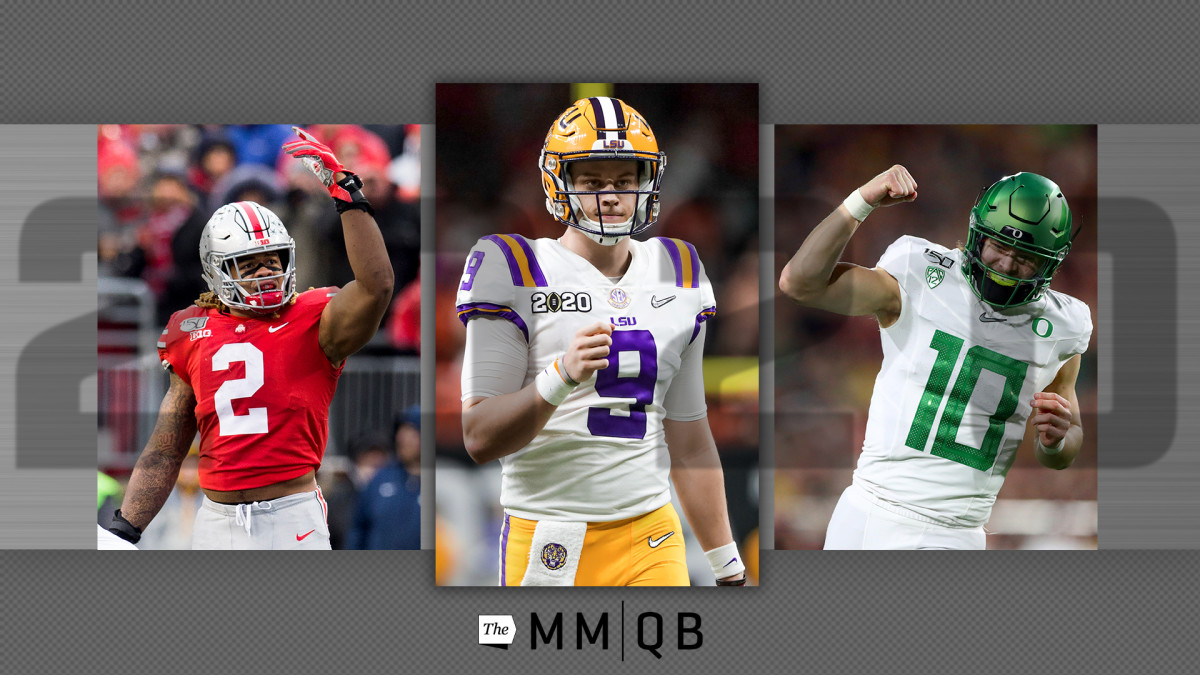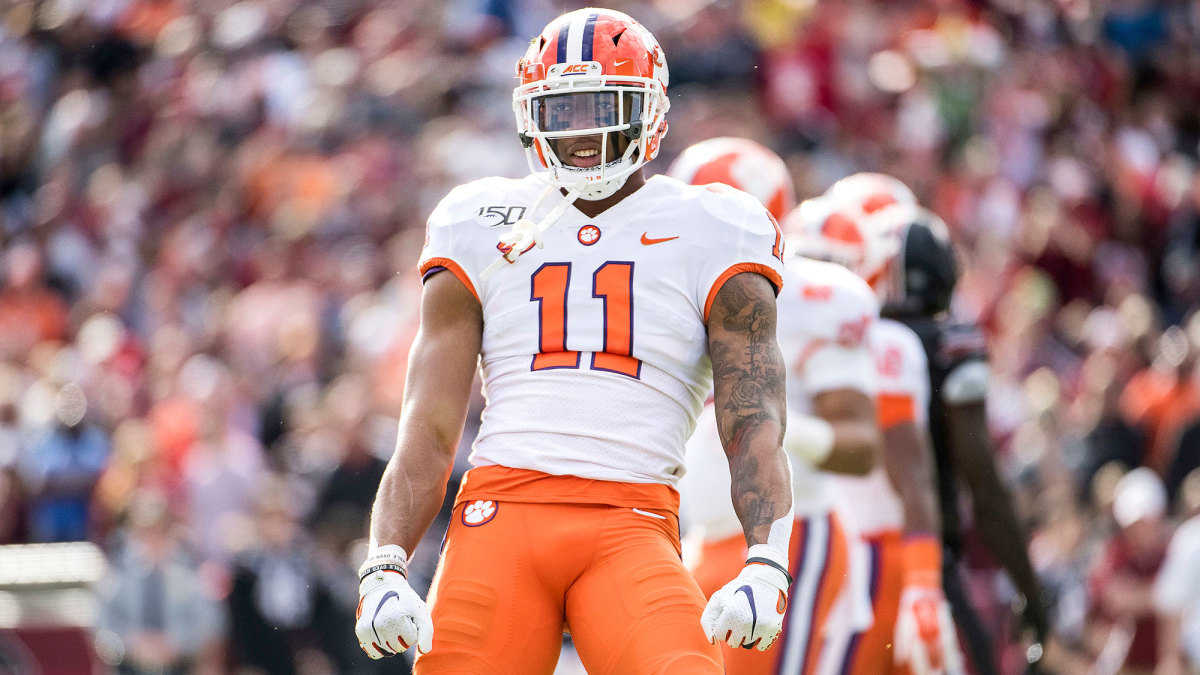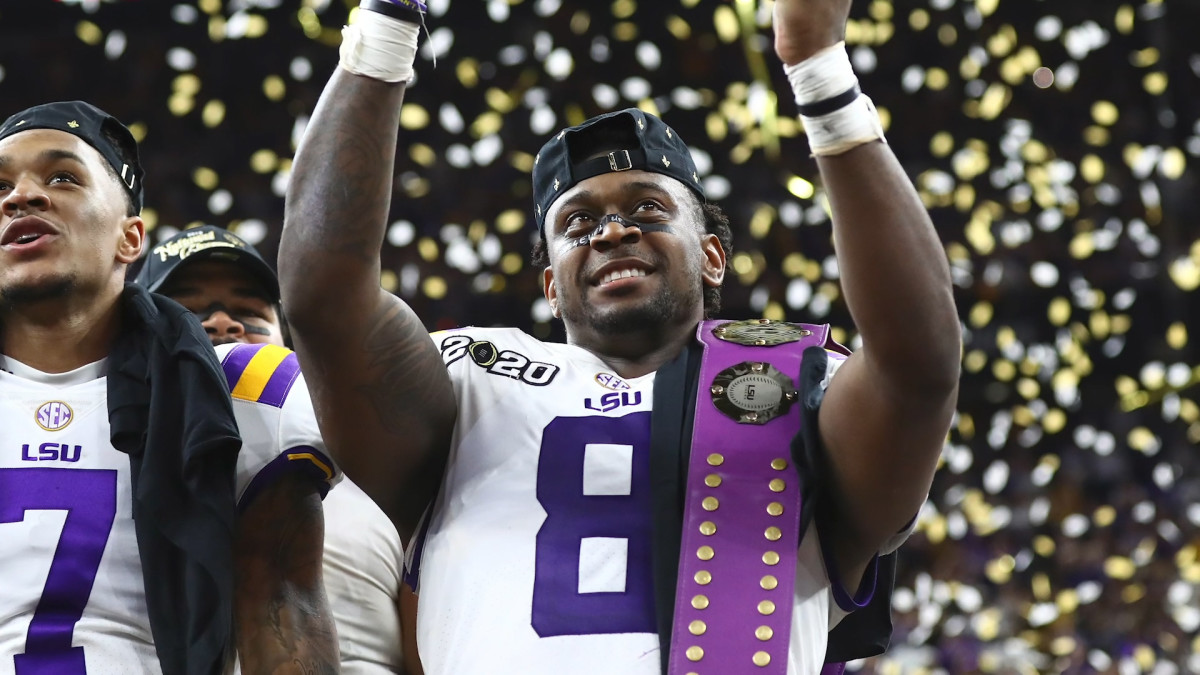2020 NFL Mock Draft 18.0: One Final Mock on the Eve of the Draft
The unpredictable nature of the NFL draft is what makes it so exciting, yet that doesn’t stop us from trying to predict it.
As one NFL general manager recently told NFL Network’s Ian Rapoport, “The media is wronger about mock drafts this year than you guys have ever been.” If my final mock this year is only “as wrong as usual,” does that mean I have exceeded expectations?
Given all of the moving parts of a virtual draft, front offices will face some potential communication challenges as teams are spread out. Earlier this month, long-time draft guru Gil Brandt speculated about the potential of “probably fewer” trades taking place. That said, I’ve projected a couple trade scenarios that I believe make sense.
With less than 24 hours to go, here is my final projection for the 2020 NFL draft:

1. Cincinnati Bengals: Joe Burrow, QB, LSU
The odds that Cincinnati passes on Burrow are slim-to-none (or 1,000/1, to be exact). In a draft full of intrigue, Burrow has been the wire-to-wire pick throughout the pre-draft process for good reason. Always composed under pressure, Burrow throws with pinpoint accuracy and uses his mobility to extend or make plays. Playing his best in the biggest moments of LSU’s championship-winning season, Burrow brings leadership, intangibles and toughness to his home-state franchise.
2. Washington: Chase Young, EDGE, Ohio State
Building upon his end-of-season momentum as a true sophomore (when he had six sacks over the final four games), Young broke Ohio State’s single-season sack record with 16.5 in 2019. While the elite-level production matches his high-end traits, Young’s impact goes beyond the box score as the disruptive edge defender will create plenty of one-on-one opportunities for Montez Sweat and his Washington teammates as opposing offensive coordinators game plan for Young.
3. Detroit Lions: Jeffrey Okudah, CB, Ohio State
This is where the draft gets more interesting. Will Okudah become the first defensive back selected in the top three during Okudah’s lifetime? Will the Lions be able to entice a team to move up a few spots, which would then allow them to acquire more draft capital and still get their guy? Absent a trade back, the Lions will consider Derrick Brown and Isaiah Simmons here as well, but Okudah is a complete corner with an ideal blend of size, length, athleticism and competitiveness.
4. New York Giants: Jedrick Wills, OT, Alabama
This choice likely comes down to Simmons or Dave Gettleman’s preferred “hog molly.” Last year’s starting right tackle Mike Remmers is now in Kansas City. While the Giants signed Cameron Fleming in free agency, his deal is for one year and he’d be better utilized as a swing tackle than as an every-week starter. Meanwhile, left tackle Nate Solder has not lived to the expectations of his massive contract. A two-year starter at right tackle for the Tide, Wills is dominant as a run blocker with outstanding movement skills that should allow him to develop into a high-end starter at either tackle spot.
5. Miami Dolphins: Justin Herbert, QB, Oregon
Earlier this offseason, Dolphins owner Stephen Ross voiced concerns about Tua Tagovailoa’s health. Despite positive reports leading up to Tua’s virtual pro day, the Dolphins were unable to bring him in for a visit, which could prevent the franchise from risking a top-five pick on him. Herbert has across-the-board plus traits—size, arm strength, mobility and intelligence—and the Senior Bowl’s Jim Nagy called concerns about Herbert’s quiet leadership style a “false narrative.”
6. Los Angeles Chargers: Tua Tagovailoa, QB, Alabama
Coach Anthony Lynn recently said that Tyrod Taylor is “in the driver’s seat” to start, which makes sense—especially given that Easton Stick is the only other quarterback on the roster. In this draft scenario, Tagovailoa is afforded a redshirt season and can take over in 2021 when Taylor becomes a free agent. When healthy, Tua throws with a quick release, elite accuracy and anticipation, and has the intangibles and leadership to develop into a franchise quarterback.

7. Carolina Panthers: Isaiah Simmons, LB, Clemson
The converted safety won the Butkus Award, given to the nation's top collegiate linebacker, but the do-it-all defender has lined up nearly everywhere. As Dabo Swinney has said, it’s “like getting three first-rounders” with Simmons, due to his versatility. With rare athleticism (4.39 in the 40 at 238 pounds) and playmaking ability, Simmons ended 2019 with 104 tackles, eight sacks, three interceptions and two forced fumbles.
8. Arizona Cardinals: Derrick Brown, IDL, Auburn
The Cardinals enter Thursday night already a draft winner, after trading their second-round pick for DeAndre Hopkins. As much as Kyler Murray may lobby for his former teammate (CeeDee Lamb), Steve Keim uses this pick to reinforce the team in the trenches. The Cardinals ranked last in the NFL in total defense in 2019 and Brown is the top-ranked player left on my board. Due to his size, strength and consistent motor, Brown is a dominant run-stuffer with the versatility to play multiple spots along the line.
* Projected trade: The Falcons send the 16th and 47th picks to the Jaguars in exchange for the ninth pick.
9. Atlanta Falcons: C.J. Henderson, CB, Florida
With Desmond Trufant now in Detroit, Atlanta’s top three returning corners—Blidi Wreh-Wilson, Isaiah Oliver and Kendall Sheffield—graded out as PFF’s 56th, 78th and 107th cornerbacks, respectively. If Thomas Dimitroff doesn't trade up with former lieutenant Dave Caldwell, the Falcons risk Henderson being selected by the Raiders or 49ers at No. 12 or 13, respectively, if not by the Jags themselves in this spot. Given his blend of size, length, speed and agility, Henderson has elite coverage skills and helps address what is arguably the Falcons’ biggest need.
10. Cleveland Browns: Tristan Wirfs, OT, Iowa
The Browns signed right tackle Jack Conklin to a three-year deal in free agency, but there is still a huge need at left tackle. The first true freshman to start at tackle during the Kirk Ferentz era at Iowa, Wirfs has freakish athleticism for someone his size and he has the versatility to play either tackle spot or kick inside, if necessary.
11. New York Jets: Mekhi Becton, OT, Louisville
The Jets ranked near the bottom of Football Outsiders offensive line rankings in both run blocking (31st) and pass blocking (30th) in 2019. While the Jets have made several additions to the offensive line via free agency, I don’t think Joe Douglas is done yet. A mountain of a man (6'7" and 364 pounds) with vines for arms (35 5/8"), the 20-year-old Becton has work to do on technique, but he has rare movement skills for his size and as much potential as any offensive lineman in the draft.
12. Las Vegas Raiders: CeeDee Lamb, WR, Oklahoma
Darren Waller had a breakout season (90/1,145/3) in 2019, but the trade for Antonio Brown turned out to be a failed experiment. Three wide receivers—Jerry Jeudy (No. 8), Lamb (No. 9) and Henry Ruggs III (No. 12)—sit inside of the top 12 on my big board and Mike Mayock has his choice here. Scoring 26 touchdowns in 27 games over the past two seasons, Lamb has outstanding hands, body control and run-after-catch ability.
13. San Francisco 49ers (via IND): Henry Ruggs III, WR, Alabama
Deebo Samuel had a productive rookie season, including three 100-yard games in the second half, but Emmanuel Sanders departed in free agency. After posting a combine-fastest 40-yard dash (4.27), Ruggs would give NFC West defensive coordinators nightmares given his possibilities when paired with one of the league’s best and most creative play callers in Kyle Shanahan.
14. Tampa Bay Buccaneers: Andrew Thomas, OT, Georgia
Getting Thomas may require a trade up, something I projected in a mock earlier this month, but the player/team fit is ideal. By signing Tom Brady to a two-year deal, the Bucs have gone all-in and Thomas is the most pro-ready of the top four offensive tackles. With starting experience at both left and right tackle at Georgia, Thomas provides the Bucs with an immediate upgrade at right tackle and the long-term upside to slide over to the left side, if needed.
15. Denver Broncos: Jerry Jeudy, WR, Alabama
Both Drew Lock and Noah Fant showed promise in their rookie seasons and Courtland Sutton had a breakout sophomore campaign (1,112 yards). The Broncos could use an upgrade opposite Sutton, however, as no other returning wide receiver reached the 300-yard mark in 2019. Jeudy is my top-ranked receiver, but there is some concern about his knee, which could be a a tie-breaker amongst the other top receivers. The 2018 Biletnikoff Award recipient is an advanced route-runner and ended his collegiate career on a high note (6/204/1 vs. Michigan).
* Projected trade: The Falcons send the 16th and 47th pick to the Jaguars in exchange for the ninth pick.
16. Jacksonville Jaguars: Javon Kinlaw, IDL, South Carolina
There has been some turnover on the Jags’ defensive line as they have declined Marcell Dareus’s option and traded Calais Campbell this offseason. In addition, Yannick Ngakoue could be [hopes to be] moved as we approach the draft. Due to his blend of size, length, strength and quickness, Kinlaw has as much pass-rush upside as any interior defender in this year’s draft.
17. Dallas Cowboys: K’Lavon Chaisson, EDGE, LSU
In his lone season with the Cowboys, Robert Quinn, now in Chicago, had a team-high 11.5 sacks in 2019. Signing Aldon Smith, who hasn’t played since 2015, highlights the pass-rushing need opposite Demarcus Lawrence. While Chaisson missed nearly all of 2018 with a torn ACL, the 20-year-old has elite burst off the edge and came on late—4.5 sacks in his final four games—to lead LSU in sacks, tackles for loss and QB hurries in 2019.
18. Miami Dolphins (via PIT): Austin Jackson, OT, USC
Most of Miami’s free-agent spending was focused on the defensive side of the ball. While Chris Grier has added Ereck Flowers and Ted Karras on the interior, the team still has one of the worst offensive lines in football and could use upgrades at both tackle spots. The 20-year-old Jackson may have benefited from returning to USC for another season, but his quick feet and athleticism could entice the Dolphins to take a chance on his long-term upside as his technique catches up to his athleticism.
19. Las Vegas Raiders (via CHI): Kristian Fulton, CB, LSU
With the team’s two first-round picks, the Raiders have addressed their two biggest post-free agency needs (wide receiver and cornerback). Fulton is a patient and physical corner with decent size. While he may not have elite long speed, he checked the box with a 4.46 in the 40 at the combine and he's quick, fluid and sticky in coverage.
20. Jacksonville Jaguars (via LAR): A.J. Terrell, CB, Clemson
With both 2019 outside starting cornerbacks—Jalen Ramsey and A.J. Bouye—no longer on the roster, the Jags will likely use one (or multiple) early picks on a cornerback. While he didn’t have a stellar performance against Ja’Marr Chase and LSU in the national championship game, Terrell is a long and athletic corner that would help address one of the team’s biggest needs.
21. Philadelphia Eagles: Justin Jefferson, WR, LSU
Philadelphia’s top three receivers (entering 2019)—Alshon Jeffery, DeSean Jackson and Nelson Agholor—missed 24 games combined games last year. Agholor is now a Raider, Jeffery’s future in Philly is uncertain and second-rounder J.J. Arcega-Whiteside underwhelmed as a rookie. Jefferson is a good route-runner with outstanding ball skills, ran a faster-than-expected 40-yard dash (4.43) and is coming off a prolific season (111/1,540/18) for the national champions.
22. Minnesota Vikings (via BUF): Josh Jones, OT, Houston
Mike Zimmer has talked about the potential of moving Riley Reiff to guard and Brian O’Neill from right to left tackle. A four-year starter at Houston, Jones has the length, quick feet and movement skills coveted in a left tackle.
* Projected trade: The Ravens send the 28th and 92nd picks to the Patriots in exchange for the 23rd pick.
23. Baltimore Ravens: Kenneth Murray, LB, Oklahoma
If only one linebacker is off the board through the first 22 picks, the Ravens could be aggressive to target one here. After all, they have multiple picks in Rounds 2, 3 and 4. Over the past two offseasons, the Ravens have lost C.J. Mosley (2019), Josh Bynes (’20) and Patrick Onwuasor (’20) via free agency. A tackling machine for the Sooners, Murray has the non-stop motor, sideline-to-sideline range and leadership to become an impact defender in the middle of the Ravens defense.

24. New Orleans Saints: Patrick Queen, LB, LSU
A.J. Klein signed a three-deal with the Bills in free agency but four of the team’s top remaining linebackers—Demario Davis, Kiko Alonso, Alex Anzalone and Craig Robertson—are scheduled to become unrestricted free agents next offseason. One of the youngest prospects in the draft (he turns 21 in August), Queen played his best football down the stretch of LSU’s title run. While he’s a bit undersized, Queen is a three-down linebacker with outstanding speed that excels in coverage.
25. Minnesota Vikings: Jaylon Johnson, CB, Utah
With Xavier Rhodes, Trae Waynes and Mackensie Alexander no longer in Minnesota, the Vikings could prioritize corner over wide receiver, given the wide receiver talent that will be on the board in Round 2. A fluid athlete at 6' and 193 pounds, Johnson has started 29 games over three seasons and has seven career interceptions and 28 passes defended.
26. Miami Dolphins (via HOU): Xavier McKinney, S, Alabama
The Dolphins have added several new starters—Kyle Van Noy, Shaq Lawson and Byron Jones—on defense via free agency. They add another projected starter here with McKinney, a versatile defender with experience at both safety spots. The junior tied for the team lead in interceptions (three) last season at Alabama.
27. Seattle Seahawks: Yetur Gross-Matos, EDGE, Penn State
While Jadeveon Clowney remains a free agent and has lowered his contract expectations, John Schneider has said that the “door is not closed” on bringing him back. Even though they have brought back 32-year-old Bruce Irvin, the Seahawks could use more pass-rush help. Gross-Matos has ideal length, a non-stop motor and quick first step, and has recorded 34.5 tackles for loss and 17 sacks over the past two seasons combined.
* Projected trade: The Ravens send the 28th and 92nd picks to the Patriots in exchange for the 23rd pick.
28. New England Patriots: A.J. Epenesa, EDGE, Iowa
Still without a second-rounder, the Patriots could use one of their (now) four third-rounders (including my projected trade) to later move up into Round 2 and potentially target a tight end, such as Notre Dame’s Cole Kmet. For this pick, however, Epenesa could remind Bill Belichick of one of his former players (Trey Flowers). The former Hawkeye wins with a blend of power, length, technique and heavy hands, and has the versatility to rush from the inside as well. While he started 2019 slowly, Epenesa closed the season strong with eight sacks and four forced fumbles over his final five games.
29. Tennessee Titans: Isaiah Wilson, OT, Georgia
No team runs its offense through their running back more than the Titans do with Derrick Henry. A two-year starter at right tackle at Georgia, Wilson is a massive (6' 7", 350 pounds) road grader who fills the void created by Jack Conklin’s free-agency departure.
30. Green Bay Packers: Ezra Cleveland, OT, Boise State
In terms of team needs, this pick could certainly be a wide receiver—and that’s something that I’ve slotted to the Packers in several previous iterations of my mock. Given the depth at receiver, however, it might be more realistic to target one on Day 2 and use this pick to reinforce the trenches with the ultra-athletic left tackle from Boise State.
* Projected trade: The Colts send the 34th and 122nd picks to the 49ers in exchange for the 31st pick.
31. Indianapolis Colts: Jordan Love, QB, Utah State
With no picks again until Round 5, the 49ers will actively look to trade back. The further Love slides to the end of Round 1, the more it would entice the Colts to move up for the chance to have a fifth-year option on him. Love has been described by one NFL head coach as a “poor man's (Patrick) Mahomes” due to his live arm, plus mobility and improvisational skills. The current environment makes it difficult for rookies to start, but the high-upside signal-caller would have an adjustment year in this scenario as he sits behind Philip Rivers and Jacoby Brissett, both of whom are free agents in 2021.
32. Kansas City Chiefs: Cesar Ruiz, IOL, Michigan
While I think he could go as high as 17th to the Cowboys as a Travis Frederick replacement, Ruiz makes sense here as the Chiefs could use an upgrade at center and left guard. A three-year starter at both center (26 games) and guard (five games), Ruiz sits atop my interior offensive rankings and has allowed just 19 pressures on 895 pass-blocking snaps since 2018, per PFF.
Kevin Hanson joins SI for the 2020 NFL draft season. His NFL mock drafts have graded as the most accurate over the past five years, per The Huddle Report. His 2015 NFL mock draft graded as the most accurate and his 2019 NFL mock draft was the second-most accurate out of 101 draft analysts.
***
Everything You Need to Know About the NFL Draft: Sign up for Sports Illustrated’s newsletters and get complete NFL Draft coverage and analysis -- delivered right to your inbox.
